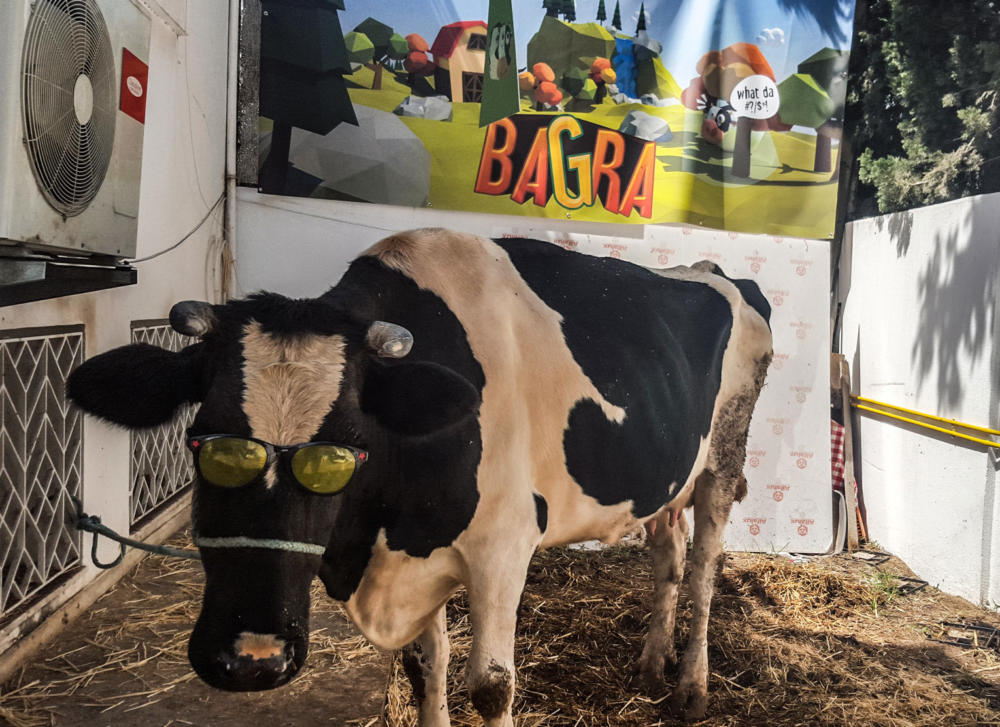Everyone in the office was thrilled when Pamela showed up for her first day at DigitalMania Studio, a video game company in Tunisia. She couldn’t code. She was worthless as a beta tester. She had a habit of farting and urinating on people who annoyed her. But wow, could she moo.
“And we got used to the smell,” says Sami Zalila, DigitalMania’s communication manager.
Pamela’s job? Prove to skeptics that the company really would give a cow to the top scorer of Bagra the Game.
The company’s mission is “to provide games with added value,” Zalila explains. So the developers came up with the idea of awarding an animal as a prize. Dogs and cats were deemed too boring. Same with sheep — and goats! — because they are “very usual in our culture,” Zalila says.
But cows are different. “A cow is a real added value,” Zalila says. In Tunisia, a cow goes for $1,500.
That’s why DigitalMania created Bagra (which means “cow” in Arabic), a mobile game about cows that debuted in April. Specifically, it’s about using UFOs to steal as many cows as possible. “It’s a myth that exists — some people say aliens came to earth to steal cows,” Zalila says.
Because DigitalMania does not have a cow-snatching spaceship at its disposal, transporting the prize to the winner is a complicating factor. So players vying for a bovine have to be located in Tunisia. There are plans to make the game available to people in other countries, Zalila says, and every two weeks, whoever is at the top of that leader board is entitled to a cow.
It will be up to far-flung winners, however, to figure out how to get the cow out of Tunisia. If they can’t manage it, they can donate the cow to a poor family through an NGO or opt for an alternative prize: “We will send the cow as steaks so they can have a big BBQ,” Zalila says.
Lucky Pamela is still in one piece. At the beginning of the month, she was sent off with Bagra’s first winner, whose game nickname is “Ramzi.” He lives in Mornag, about 18 miles away, and he came to DigitalMania with 10 family members to check out if the cow was real, Zalila says. The plan was to to slaughter her for a relative’s wedding … until the family was informed that the heifer is pregnant. So instead, they took her to a rural part of the country to roam on a farm. (At least, that’s what Zalila was told. He has asked for pictures.)
Zalila hopes others winners see the value in keeping the prize cows alive. “They can really help people with milk,” he says. And for a family with limited resources, playing Bagra is one of the cheapest possible ways to get a cow, adds Zalila, who points out that it’s free to play. It is possible to spend money on apps to improve your position, but in this debut round, only 2.5 percent of the 5,000 players opted to do so. Their average expenditure: The equivalent of about $2.25. So there’s a chance, Zalila says, that the game will catch on with farmers.
Meanwhile, DigitalMania staffers now have a better understanding what it’s like to be a farmer. Pamela lived in the backyard of the office in Tunis for three weeks, getting milked, fed and cleaned. They cuddled with her and posed for pictures.
“When she was gone, we were sad. We can’t listen to her moo in the background,” says Zalila, who adds that other cows — including Brigette, who’ll be awarded in early June — won’t be moving in to take Pamela’s spot. “It’s hard for a cow to live in such a place.”
But there might be space for smaller animals. “We are considering chickens,” Zalila says.
9(MDA3MTA1NDEyMDEyOTkyNTU3NzQ2ZGYwZg004))
